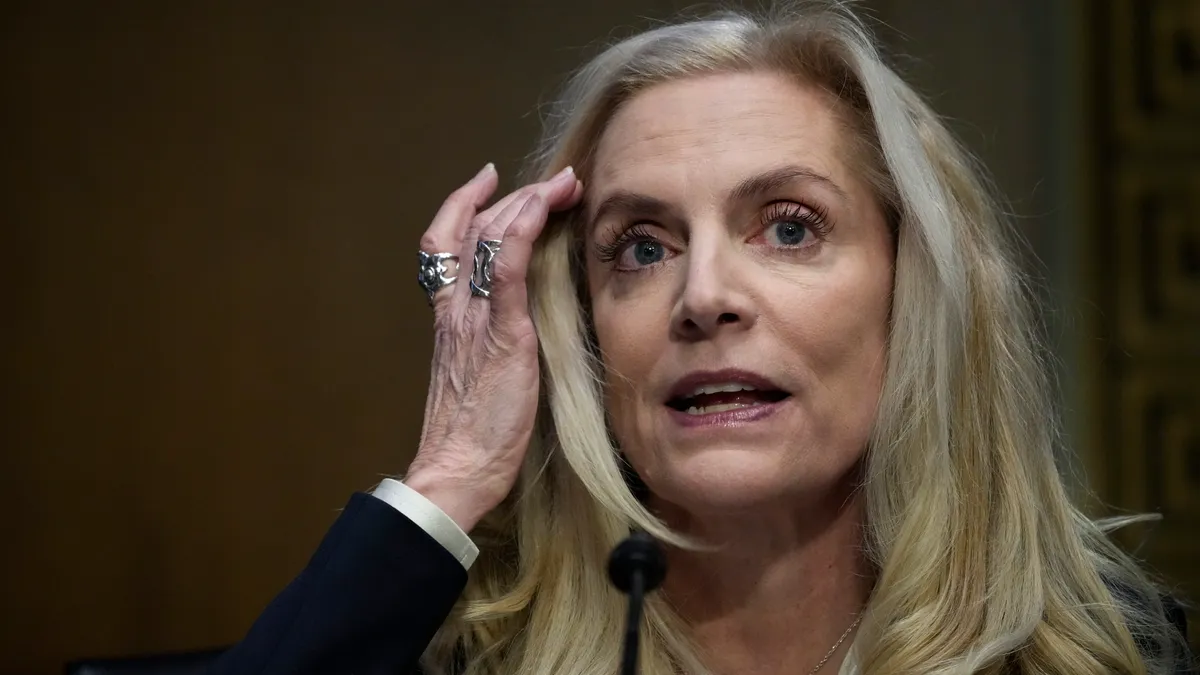The Senate Banking Committee on Wednesday advanced the nominations of several Biden administration picks to serve on the Federal Reserve Board of Governors.
The 12 Democrats and 12 Republicans on the panel voted 23-1 to approve the renomination of Jerome Powell as the central bank’s chair. The lone “no” came from Sen. Elizabeth Warren, D-MA, who signaled her opposition in September, calling Powell “a dangerous man to head up the Fed.”
The only nominee Wednesday to get unanimous support was Philip Jefferson, the Davidson College professor who worked as an economist for the Fed in the 1990s and, if approved by the full Senate, would become the fourth Black man to serve on the central bank’s board.
Fed Gov. Lael Brainard’s bid to become the central bank’s vice chair saw approval by a 16-8 vote. As for Brainard's chances in the full Senate, she has garnered bipartisan backing before. The Senate in 2014 confirmed Brainard to her governor role by a 61-31 margin.
Lisa Cook, a Michigan State University professor whose research has focused heavily on the racial disparity of wealth, received no Republican support Wednesday. But the 12-12 party-line vote will be enough for her nomination to advance to the full Senate through a motion by Majority Leader Chuck Schumer, D-NY. Cook, if approved, would become the first Black woman to serve as a Fed governor.
Wednesday’s votes came just one day after Sarah Bloom Raskin — President Joe Biden’s pick to serve as the Fed’s vice chair for supervision — withdrew from consideration. Republicans’ reservations over her views related to climate change prompted the banking panel’s 12 GOP members to skip previous attempts to advance the nominations of the full slate of Fed candidates.
After Wednesday’s procedure, Sen. Pat Toomey, R-PA, the banking panel’s ranking member and linchpin of the Raskin boycott, telegraphed his hesitation on two of the Fed nominees.
“I’m concerned Governor Brainard and Professor Cook will undermine the Fed by straying away from the Fed’s limited responsibilities and into unrelated and highly charged political issues,” Toomey said in a statement Wednesday.
Climate conundrum
Regarding Brainard — as with Raskin — Toomey means climate change.
Toomey asked Brainard during her January nomination hearing whether her support for more climate research and analysis at the Fed was "a precursor to direct capital away from" fossil-fuel companies.
"We would not tell banks which sectors to lend to or not lend to, but we do want to make sure they are measuring, monitoring and managing [their] material risks,” Brainard said, adding, "I have not suggested we do stress tests for climate."
Toomey replied that he saw “little more than a semantic difference” between the Fed’s climate scenario analysis and a full-fledged stress test.
Toomey on Wednesday also called Brainard "an author and outspoken advocate of the Fed’s new monetary policy framework, which led to the 40-year high inflation we’re witnessing today.”
The Federal Open Market Committee (FOMC) — on which Brainard serves — voted Wednesday to raise interest rates by a quarter percentage point in a move meant to counteract inflation. Wednesday's interest rate increase is the first since 2018.
Toomey, meanwhile, said Cook's "history of inflammatory partisan rhetoric and extreme left-wing political advocacy will further politicize an institution suffering from a credibility problem due to its involvement in controversial policy debates."
In opening remarks Wednesday, Senate Banking Committee Chair Sherrod Brown, D-OH, praised the slate of Fed nominees as "not only ... racially diverse and gender diverse — it's experience and ideas diverse."
“They know economic growth only matters if it shows up beyond corporate balance sheets," Brown said.
As for the vacant vice chair for supervision role, White House Press Secretary Jen Psaki told Bloomberg on Wednesday that Biden would put forward a new nominee, though she didn't give a timeline.
During the FOMC press conference Wednesday, Powell said the Fed board writ large has been handling supervision and regulation in the absence of a point person.
"We're making do with the situation we have and a good number of things have come straight to the board for approval," he said, according to American Banker.














